
Enterprise AI optimization is essential for businesses aiming to reduce costs, improve governance, and scale efficiently. The article outlines ten top tools that address challenges like fragmented AI tools, high operational costs, and compliance issues. Here’s what you need to know:
These platforms prioritize cost savings, governance, and scalability, helping enterprises manage AI tools effectively while ensuring compliance and performance at scale.

Prompts.ai is an enterprise-focused AI orchestration platform designed to tackle the challenge of fragmented tools. Instead of managing multiple disconnected AI solutions, teams can access more than 35 leading large language models - including GPT-5, Claude, LLaMA, and Gemini - through one streamlined interface.
The platform’s mission is to address what it terms "AI tool sprawl", where organizations end up with a chaotic mix of solutions. By unifying model access and workflows, Prompts.ai transforms scattered experimentation into organized, compliant processes.
Prompts.ai can reduce AI software costs by up to 98% through its Pay-As-You-Go TOKN credit system. This eliminates recurring subscription fees and ensures expenses align directly with actual usage.
This pricing model tackles a major concern for enterprises: unpredictable AI spending. Instead of juggling multiple subscription payments for various tools, businesses only pay for the tokens they consume. The platform also includes a FinOps layer that tracks token usage in real time, giving teams clear visibility into spending across projects. This enables precise cost management and ensures every dollar spent ties back to measurable business outcomes.
With these tools, teams can easily evaluate costs for each AI interaction, identify the most cost-effective models, and make informed decisions based on both performance and budget.
For enterprises, governance and compliance are critical when adopting AI. Prompts.ai integrates audit trails and compliance controls into every workflow, ensuring secure and transparent data management.
The platform provides IT teams with complete oversight of AI interactions - covering models, users, and use cases. This means organizations can track who is using which models, what data is being processed, and how sensitive information moves through the system.
Security is a top priority, with enterprise-grade data protection ensuring sensitive information remains within the organization’s control. These features not only support compliance but also encourage seamless collaboration across teams.
Prompts.ai prioritizes collaboration by fostering a shared environment for teams and offering pre-built workflows for quick deployment.
The platform’s Prompt Engineer Certification program equips organizations with internal experts who can champion AI adoption across departments. This acknowledges that successful implementation requires not just technology but also skilled individuals who know how to use it effectively.
Teams can share workflows, compare model performance side-by-side, and learn from each other’s experiences. This collaborative setup accelerates the adoption process, making it easier for organizations to scale their AI efforts while reducing the learning curve.
Built for growth, Prompts.ai’s architecture is designed to scale effortlessly, accommodating small creative teams as well as global enterprises. Adding new models, users, or teams takes just minutes, ensuring smooth performance at any scale.
The platform includes real-time performance monitoring, allowing teams to compare models and select the best tool for each task. As AI needs evolve and new models emerge, organizations have the flexibility to adapt without being tied to a single provider.
Prompts.ai ensures consistent performance and cost efficiency, making it equally effective for small teams and large-scale deployments involving thousands of users.

AgentFlow is a multi-agent platform designed specifically for regulated industries like finance and insurance. It focuses on securely orchestrating AI agents across complex workflows while adhering to the strict compliance standards these sectors demand.
What makes AgentFlow stand out is its ability to tackle both straightforward tasks and large-scale multi-agent workflows. By integrating seamlessly with existing systems, organizations can adopt the platform without overhauling their current infrastructure.
AgentFlow offers flexible deployment options, including on-premise, private VPC, or dedicated cloud setups. These options are paired with real-time performance monitoring and autonomous error recovery to ensure resilience, even during periods of high demand.
The platform's "Orchestrate" module is at the heart of its multi-agent management capabilities. It coordinates interactions across workflows, balancing tasks effectively and incorporating failover mechanisms to maintain reliability and performance during peak usage.
In live insurance workflows, AgentFlow has demonstrated impressive results, achieving over 95% extraction accuracy on underwriting submissions. It processes documents for classification and triage in under 15 seconds per document. Additionally, the platform enables real-time claim validation, which helps minimize settlement delays.
AgentFlow’s performance is further strengthened by its focus on compliance, making it a robust solution for heavily regulated industries.
Compliance, explainability, and auditability are baked into AgentFlow’s architecture from the outset. These features are not added later but are integral to the platform's design.
Key compliance tools include explainability features that allow organizations to trace how AI agents reach decisions. This transparency helps identify and address biases, errors, or risks. Comprehensive audit trails provide detailed records of all AI-driven actions, aiding both internal tracking and external audits.
The platform also employs confidence scores to measure the reliability of AI outputs. If confidence levels drop below a defined threshold, cases are automatically routed for human review, ensuring oversight on uncertain decisions.
"AgentFlow automates tasks in line with business rules and regulatory standards." - Mora Freire, Product Manager and Customer Success Lead at Multimodal
AgentFlow identifies four key areas that influence costs: AI Model Selection (30-50%), Conversation Length (20-30%), Workflow Complexity (15-25%), and Usage Volume (10-20%).
To manage these costs, the platform uses dynamic model switching. For example, it deploys cost-effective models like Claude Haiku or GPT-3.5 for Q&A and summarization tasks, while reserving premium models like GPT-4 for more complex operations. Token limits are tailored to task types: 150-300 tokens for support queries, 500-1,000 for content creation, and 1,000-2,000 for complex analysis.
By setting model temperatures between 0.0 and 0.3, the platform ensures deterministic and cost-efficient responses.
Additionally, AgentFlow reduces workflow costs by using built-in text processors and conditional logic for simpler tasks, avoiding the need for expensive AI models. This, combined with efficient conversation flow management, allows organizations to significantly cut AI operational expenses.
AgentFlow’s technical capabilities are complemented by its ease of integration. The platform can be customized to align with an organization’s data and processes.
Through its Model Context Protocol (MCP), AgentFlow connects seamlessly with enterprise systems, databases, APIs, and SaaS tools. This universal bridge enables teams to access any data source or tool within their existing tech stack.
Organizations can start small, implementing a single workflow, and then expand incrementally across functions. This modular approach allows for gradual AI adoption without disrupting existing operations, ensuring a smooth transition to enhanced workflows.
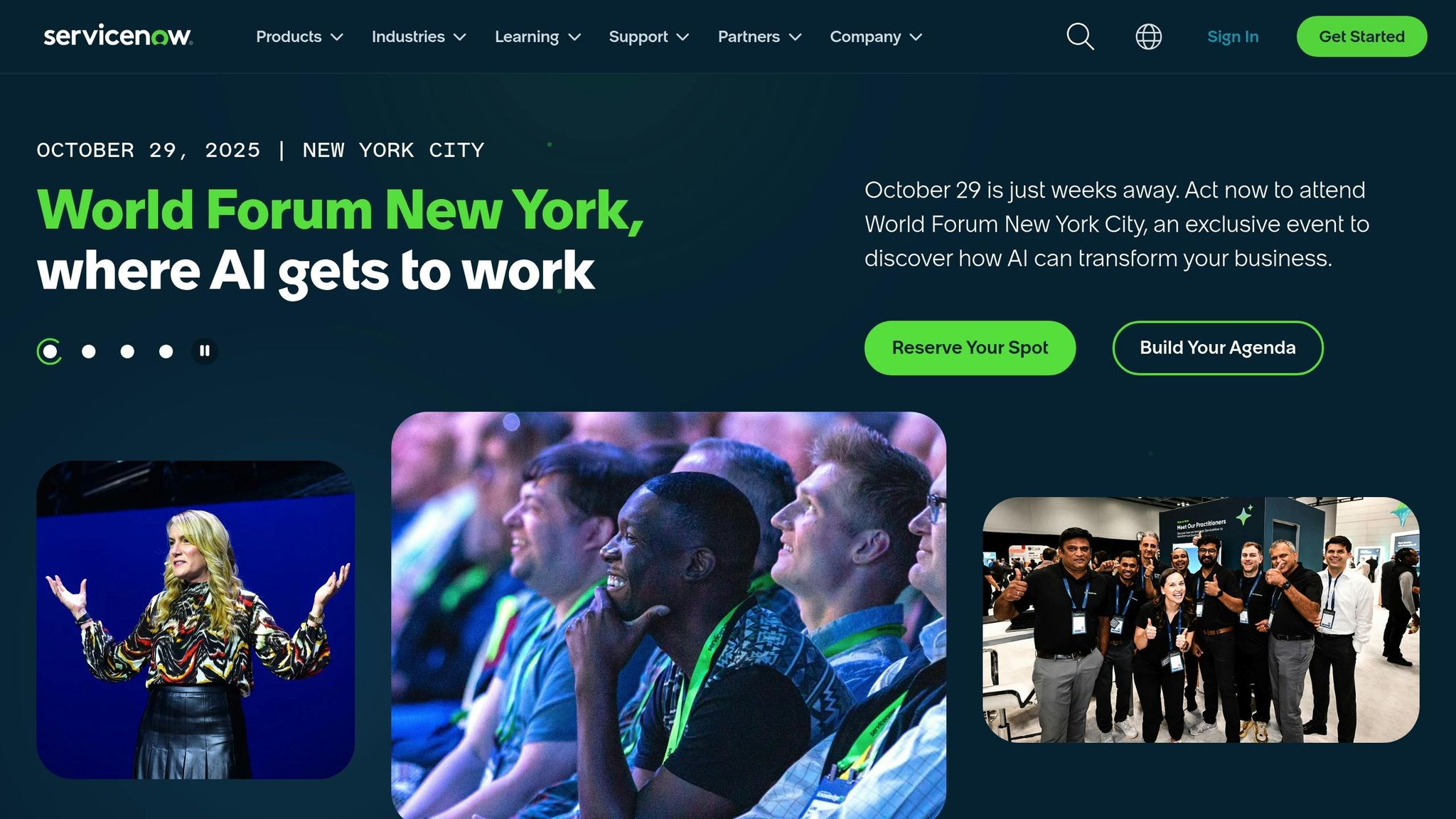
ServiceNow brings AI into the mix of workflow automation and IT service management through its Now Platform. By focusing on operational efficiency paired with strong security and compliance measures, it provides a solid foundation for optimizing enterprise operations.
The platform is designed to support scalable AI management while maintaining adherence to compliance standards, offering a range of tools and infrastructure to meet enterprise needs.
Built on a cloud-native framework, ServiceNow ensures automatic resource scaling and high availability to handle demanding workloads. Its Performance Analytics module offers real-time monitoring, providing insights into system responsiveness and resource usage. The IntegrationHub connects seamlessly with a variety of third-party applications, making it easier to extend AI solutions across the existing tech stack. To ensure uninterrupted operations, the platform employs distributed processing and automatic failover, keeping systems running smoothly even during maintenance or unexpected outages.
ServiceNow tackles governance with its Risk and Compliance framework, embedding audit trails and approval workflows into AI-driven processes. The platform's Policy Engine allows businesses to define and enforce rules governing AI behavior, ensuring compliance with regulatory standards. Automated tools manage data classification, retention, and access controls to align with regulations like GDPR, HIPAA, and SOX. Additionally, the Audit Management module provides templates to simplify regulatory reporting and streamline compliance efforts.
The IT Business Management suite tracks AI-related costs, including licensing, infrastructure, and operational expenses. It uses dynamic resource management to optimize compute allocation across workloads and employs predictive analytics to uncover potential cost-saving opportunities. The Vendor Management module centralizes procurement and contract oversight for AI services, offering better visibility into licensing, cloud services, and other expenditures, helping organizations manage budgets more effectively.
ServiceNow's Collaboration Hub integrates with popular tools like Microsoft Teams, Slack, and Zoom, enabling teams to interact with AI systems directly within familiar platforms. The App Engine empowers employees to create custom AI-powered applications using low-code/no-code interfaces, making AI development accessible across the organization. Workflow automation turns AI insights into actionable steps, while the Knowledge Management system captures and shares best practices, accelerating AI adoption and deployment.
Security is a top priority for ServiceNow, which employs a zero-trust model, encrypting data both in transit and at rest. Multi-factor authentication and role-based controls enhance access security. Its Security Operations center monitors AI systems around the clock for unusual activity or threats, with automated incident response mechanisms in place. Features like data loss prevention safeguard sensitive information throughout AI processes, ensuring enterprise data remains protected.
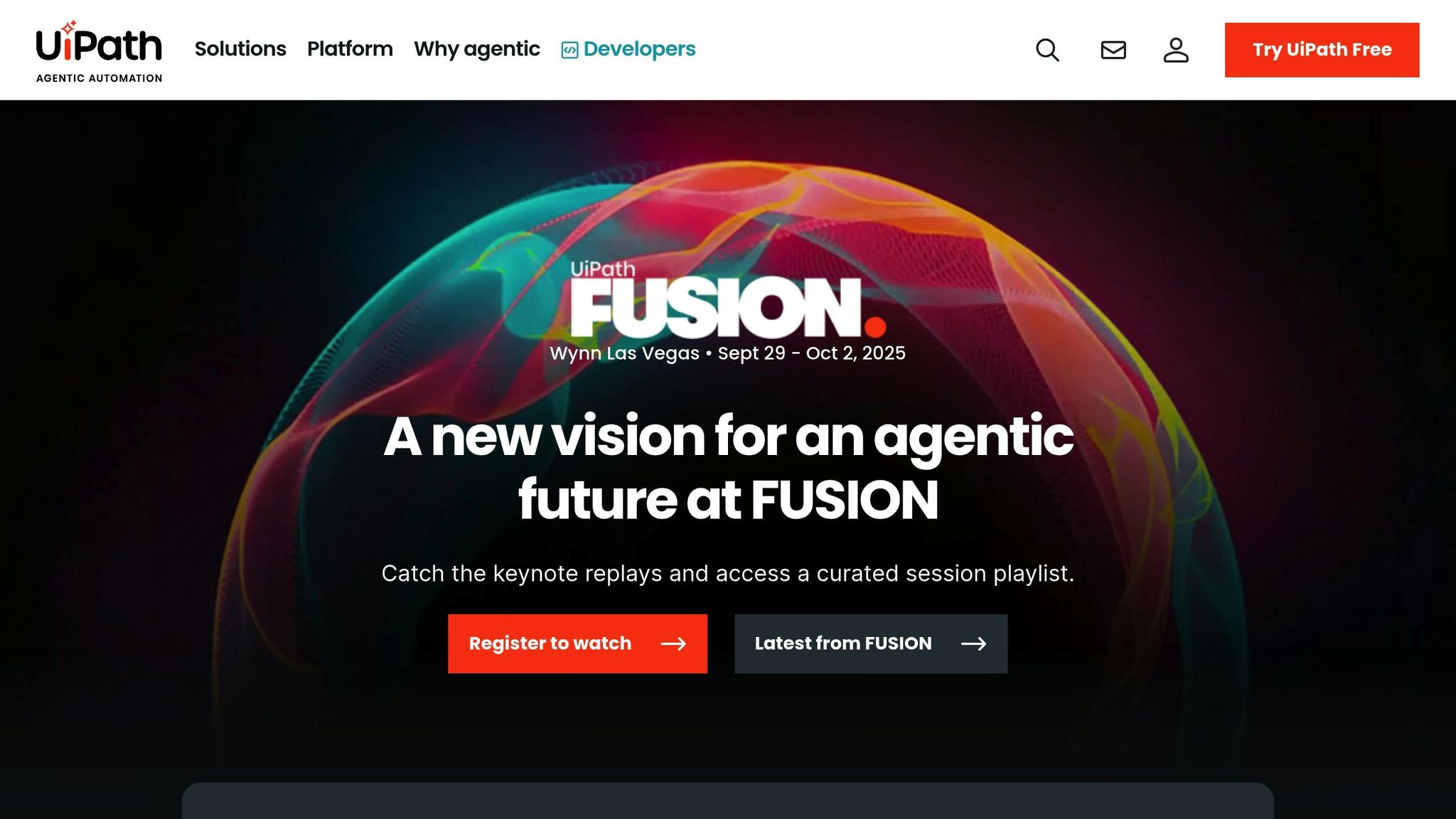
UiPath is a prominent name in the field of robotic process automation (RPA). Its platform is designed to help businesses automate repetitive tasks, streamline workflows, and improve operational efficiency. By combining artificial intelligence with automation, UiPath enables organizations to scale their processes while reducing manual effort.
The platform supports a wide range of industries, offering tools that integrate seamlessly with existing systems. This flexibility allows businesses to implement automation without overhauling their current infrastructure. UiPath’s user-friendly interface makes it accessible for both technical and non-technical users, empowering teams to create and deploy automation solutions quickly.
With features like process mining, task capture, and analytics, UiPath provides end-to-end automation capabilities. These tools help businesses identify areas for improvement, optimize workflows, and measure the impact of automation on their operations. As a result, companies can achieve significant time and cost savings while enhancing productivity.
UiPath continues to be a leader in the RPA space, constantly evolving its platform to meet the demands of modern businesses. Its commitment to innovation and ease of use has made it a go-to solution for organizations looking to embrace automation.
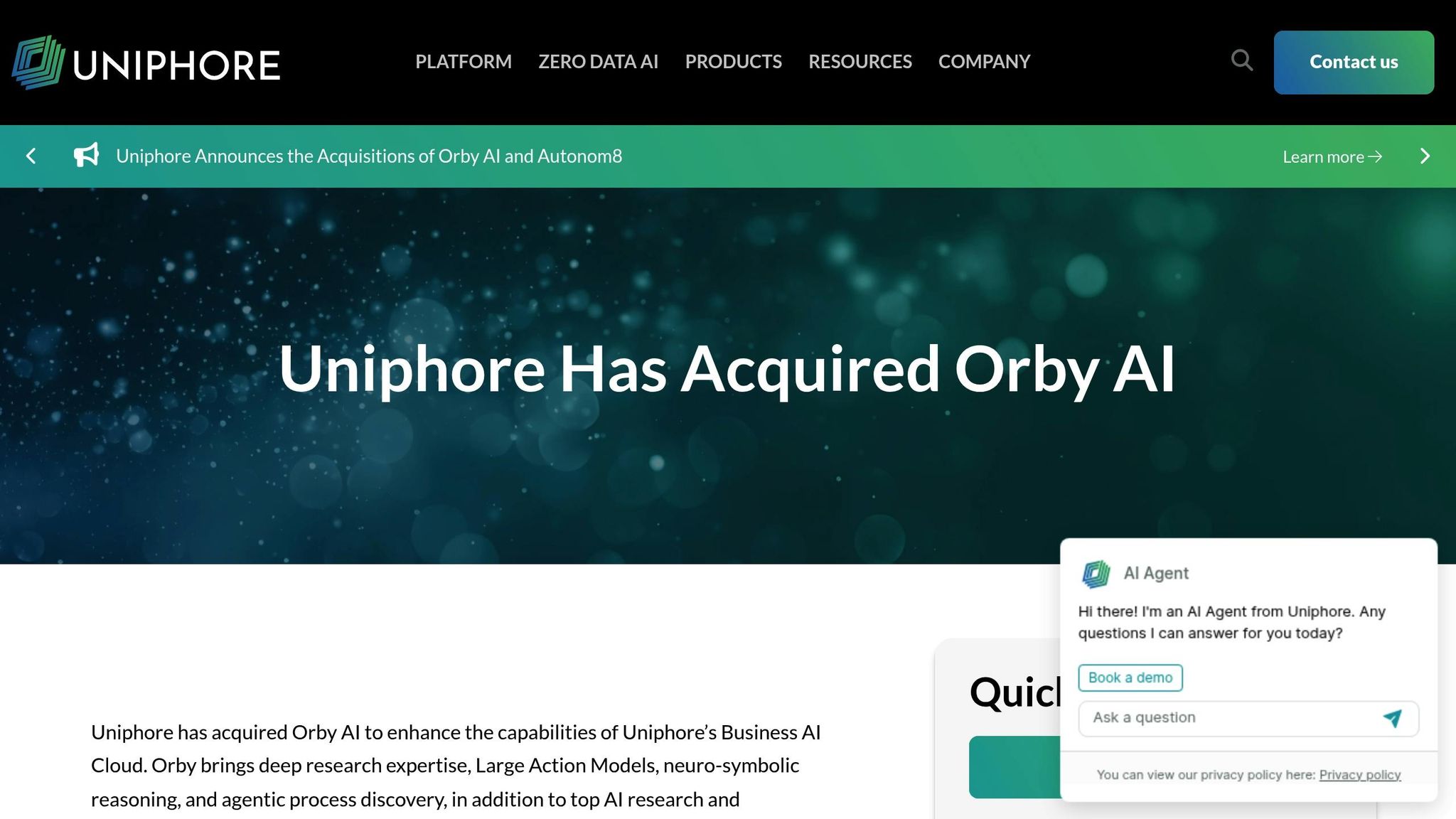
Orby AI simplifies enterprise AI workflows by combining advanced orchestration with seamless integration. Designed to automate intricate business processes, it leverages machine learning alongside intelligent task management to minimize manual effort while ensuring organizations maintain full operational oversight. What sets Orby AI apart is its ability to learn from user actions and replicate workflows automatically, making it an excellent choice for businesses aiming to scale repetitive tasks without requiring extensive technical adjustments.
The platform tackles enterprise challenges through an automation approach that observes and mimics human behavior, creating dependable AI-driven workflows. This functionality enables companies to implement automation across various departments without disrupting their current systems or demanding significant retraining efforts. Orby AI works in harmony with other frameworks, offering specialized solutions that enhance AI workflows in large-scale operations by focusing on behavioral learning and workflow replication.
With these strengths in mind, the next platform, CrewAI, takes enterprise AI optimization to the next level.
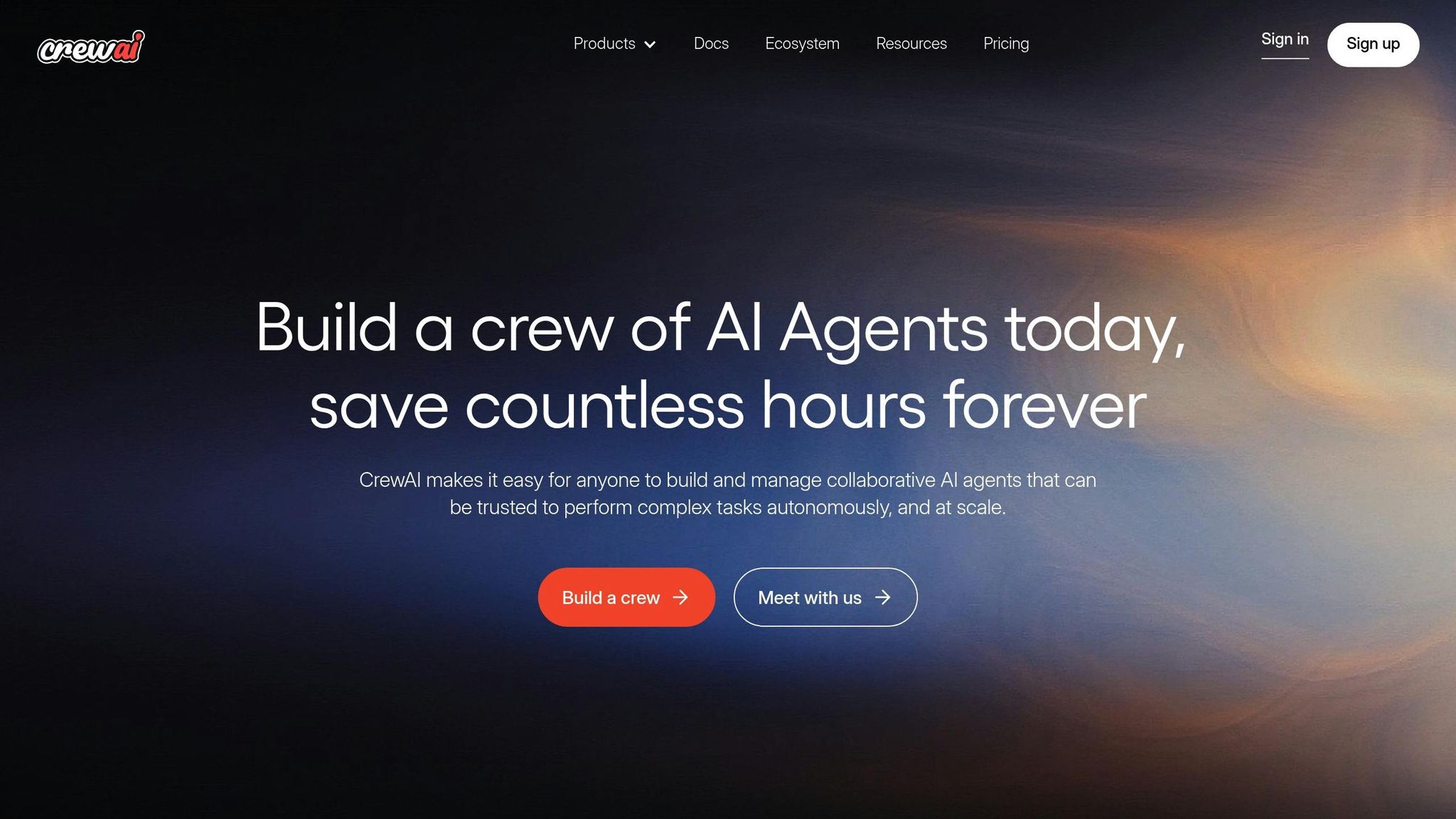
CrewAI transforms enterprise AI by enabling multi-agent collaboration, where multiple AI agents work together to tackle complex business challenges. Unlike traditional systems that rely on a single AI agent, CrewAI coordinates a team of agents that communicate, delegate tasks, and pool their expertise to deliver well-rounded solutions. This teamwork-driven approach is especially useful for enterprises facing intricate problems that require diverse skill sets.
The platform is designed to break down complicated tasks into smaller, manageable parts, assigning each to the most suitable AI agent within the team. This method ensures specialized tasks get the attention they need while maintaining smooth coordination across the board. Enterprises can customize agent roles, collaboration protocols, and quality controls to align with their operational needs. This structured approach paves the way for efficient and scalable performance across various workloads.
CrewAI is built with scalability in mind, offering a dynamic architecture that adjusts to workload demands. During peak usage or seasonal spikes, the platform deploys additional agents to handle the load, ensuring smooth operations without bottlenecks. This adaptability is particularly advantageous for enterprises that experience fluctuating workloads or project-based surges.
Performance is further enhanced through intelligent task distribution. Agents with complementary skills work simultaneously on different aspects of a project, streamlining processes that would otherwise be handled sequentially. The system continuously monitors agent performance, reallocating tasks as needed to maintain efficiency. Users have reported significantly faster processing times for complex analytics, thanks to this parallelized approach.
CrewAI integrates effortlessly with existing enterprise tools and workflows, making it easy for technical teams to adopt. The platform offers user-friendly interfaces for defining agent roles, establishing collaboration rules, and monitoring agent interactions. Business users can also access transparent logs to observe agent communications and decision-making, fostering trust in the system.
Beyond AI agent collaboration, the platform includes human oversight capabilities. Users can step into agent interactions to provide input, adjust workflows, or redirect processes as business needs evolve. This human-in-the-loop design ensures that AI efforts stay aligned with changing objectives, offering flexibility without sacrificing control.
CrewAI addresses rising AI costs through its resource-efficient design. By dynamically allocating computational resources based on current demands, the platform avoids the expense of maintaining fixed capacity for each function. This shared-resource model significantly reduces infrastructure costs compared to running separate AI systems for individual tasks. Additionally, the ability to reuse trained agents across multiple projects amplifies the return on AI investments.
The platform’s collaborative framework also eliminates the need for specialized systems by combining general-purpose agents in flexible ways. This adaptability allows businesses to explore new use cases without incurring heavy development expenses, making AI solutions more accessible across various departments and project types.
Building on CrewAI’s collaborative strengths, the upcoming solution, Vue.ai, focuses on optimizing visual and retail operations.
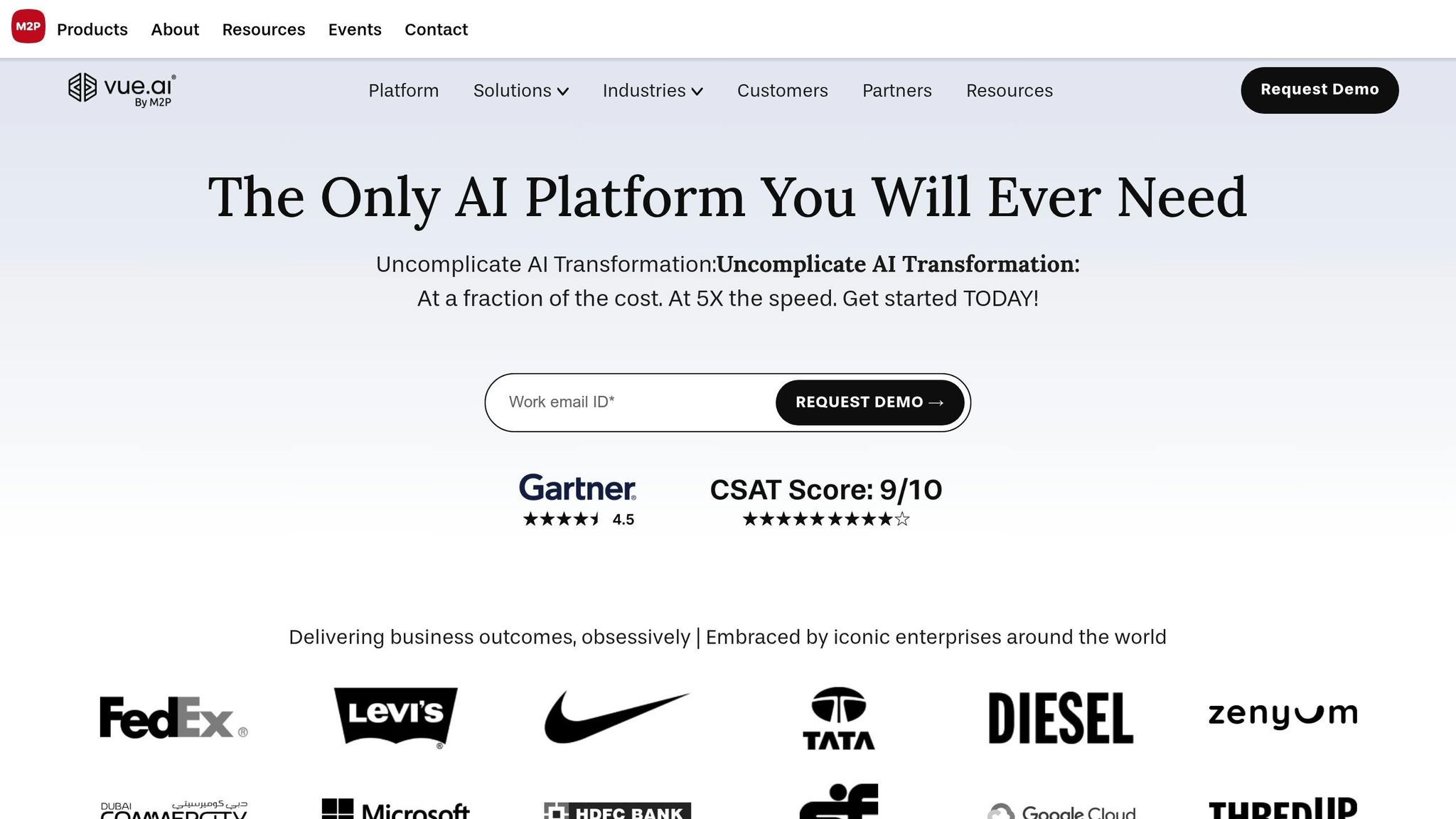
Vue.ai is a platform tailored for retail and e-commerce businesses, focusing on visual AI solutions. By using computer vision and machine learning, it automates tasks like visual content processing and product tagging. This helps businesses streamline the management of product images while improving customer experiences.
Vue.ai accelerates AI adoption with deployment speeds up to 5 times faster than traditional methods. This allows businesses to bring their visual commerce projects to life much quicker, cutting down time-to-market significantly.
Vue.ai prioritizes security from the ground up, embedding it into every aspect of its operations. An Information Security Committee (ISC), composed of executive leaders, oversees data privacy and security initiatives. This team designs strategies to meet customer needs, regulatory requirements, and contractual responsibilities while staying ahead of emerging threats. Security measures are reviewed quarterly to ensure resources and expertise remain aligned with evolving challenges.
The platform’s Governance, Risk & Compliance (GRC) framework is supported by a specialized team of security experts. They perform annual risk assessments and ongoing evaluations, including code reviews, vulnerability scans, and penetration tests, to maintain a strong security posture.
Vue.ai’s fast deployment model not only saves time but also cuts costs significantly, delivering a clear return on investment. Additionally, Prefect enhances enterprise AI operations by refining workflow orchestration and improving data pipeline efficiency.
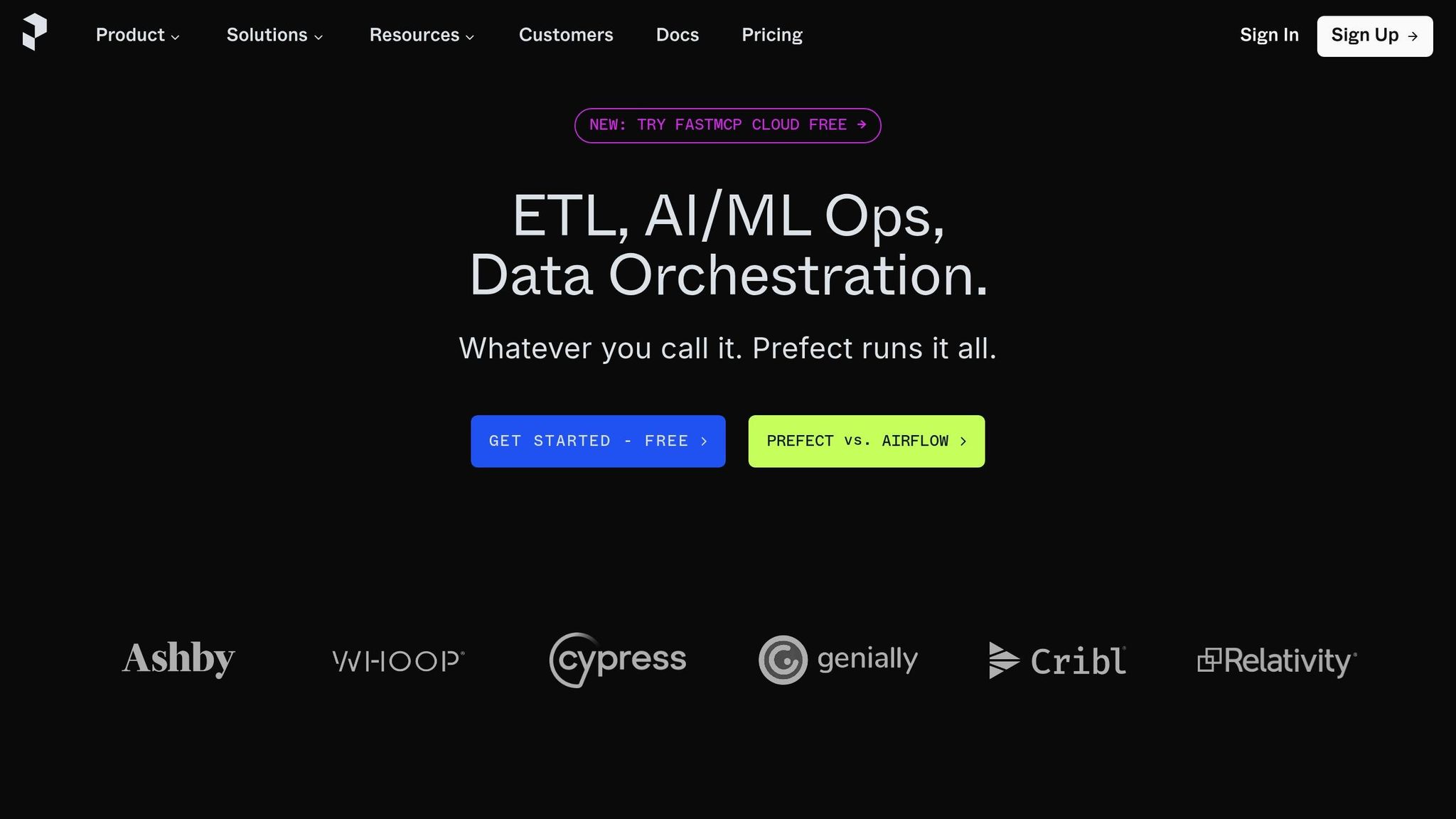
Prefect is a platform designed to orchestrate workflows, enabling enterprises to manage AI data pipelines and automation processes with ease. Built specifically for enterprise data teams, it ensures reliable execution of complex AI workflows at scale. From straightforward data transformations to advanced machine learning pipelines, Prefect helps organizations keep their AI operations running smoothly.
Prefect is built to handle enterprise-scale workloads with ease. Its hybrid execution model allows workflows to run both in the cloud and on-premises, catering to diverse security and compliance needs. The platform’s dynamic task mapping efficiently allocates resources based on data size and complexity, ensuring consistent performance even under heavy loads. Additionally, strong audit and access controls make it well-suited for enterprise environments.
Prefect provides thorough governance tools, including detailed audit trails and logging capabilities, to meet the demands of regulated industries. Every workflow is tracked with comprehensive metadata, offering full visibility and accountability. Role-based access controls allow administrators to assign precise permissions, ensuring that both technical and business teams have access tailored to their responsibilities while maintaining security.
Prefect’s intelligent resource management system helps organizations save on costs by automatically pausing workflows during periods of inactivity. This ensures that businesses only pay for compute time when it’s actively being used, which is especially useful for workloads with fluctuating processing needs.
Prefect makes workflow creation accessible to everyone on the team. Its visual workflow designer includes a drag-and-drop interface, real-time collaboration features, and version control, allowing both technical and non-technical users to build and adjust workflows with minimal effort. This user-friendly approach encourages teamwork and streamlines the development process.
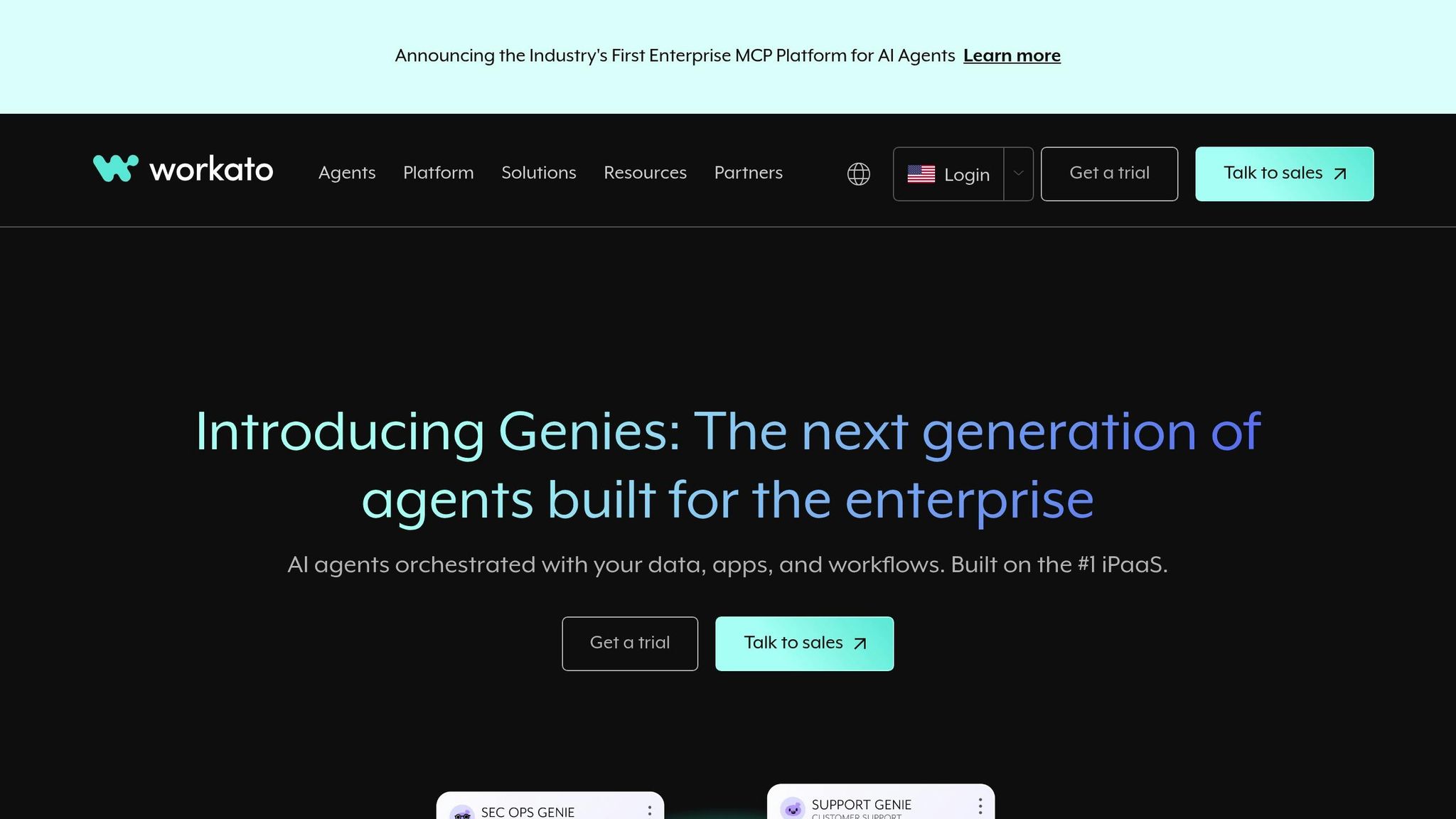
Workato is a platform designed to seamlessly connect applications, data, and processes, streamlining workflows with the help of AI-driven automation. By combining robotic process automation (RPA) with AI, it aims to enhance operational efficiency across organizations.
Built on a cloud-native framework, Workato is designed to handle high-volume operations effortlessly. Its recipe-based workflow approach allows teams to create adaptable processes that work across various departments, ensuring flexibility and efficiency.
To maintain transparency and adhere to industry regulations, Workato offers features like audit trails and data lineage tracking. Role-based access controls further ensure that permissions are managed effectively, making it suitable for industries with strict compliance requirements.
Workato employs a consumption-based pricing model, ensuring that costs align with actual usage. This approach enables organizations to manage expenses effectively based on active operations. Additionally, real-time cost monitoring dashboards provide visibility into resource usage, helping teams make informed decisions about spending. This clear pricing structure fosters a straightforward and collaborative user experience.
With its low-code interface and visual recipe builder, Workato empowers business users to create and modify workflows without needing extensive coding knowledge. Features like version control and simultaneous editing make collaboration between team members smooth and efficient.
Workato prioritizes security by implementing encryption for data both in transit and at rest. It also uses standard security protocols such as OAuth 2.0 and SAML, along with automated API key rotation, to support a zero-trust security framework. This ensures robust protection for sensitive data and workflows.
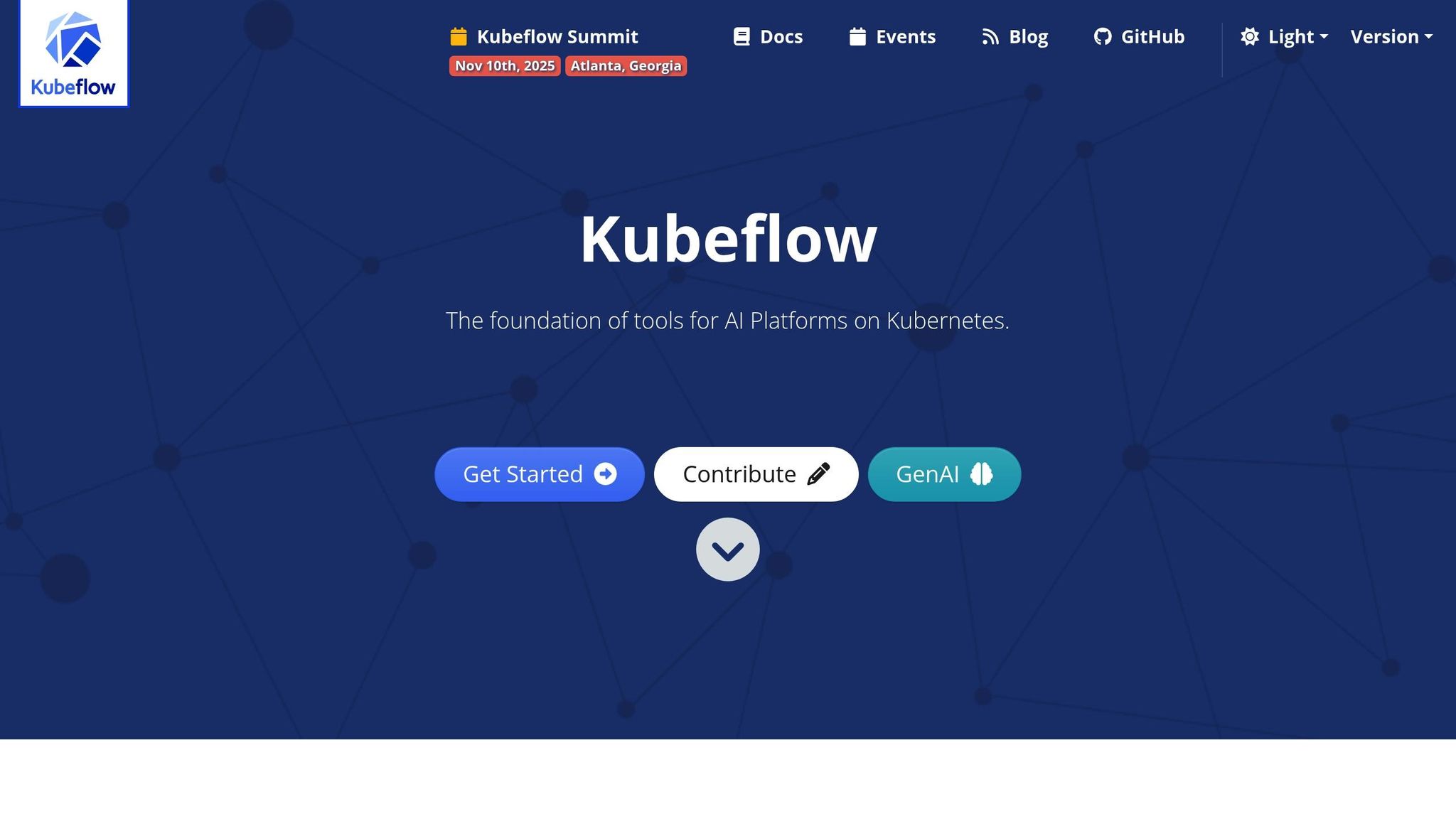
Kubeflow is an open-source platform designed to manage machine learning workflows on Kubernetes. It provides a comprehensive framework to handle everything from development to production, simplifying the deployment of AI solutions and ensuring smooth orchestration of machine learning pipelines.
Kubeflow helps reduce expenses by improving the efficiency of CI/CD pipelines for machine learning workflows. It achieves this by implementing features like caching intermediate results, tracking code and data changes at a granular level, and retraining only the components affected by updates. These automated processes significantly cut down computational overhead, making it a valuable tool for enterprises aiming to manage AI workflows effectively.
Navigating the complexities of enterprise AI requires a clear understanding of each platform's strengths and areas for improvement. This section offers a concise comparison, tying together earlier in-depth analyses with an overall performance summary.
Prompts.ai stands out by offering a streamlined orchestration of AI tools through a single interface. Its efficient FinOps controls and strong governance capabilities ensure large organizations can achieve measurable outcomes. With access to a wide range of models, significantly reduced costs, and straightforward onboarding supported by an active expert community, the platform provides the clarity and control needed to manage complex workflows safely and effectively. However, challenges such as integration hurdles or the need to adapt to evolving scalability requirements might call for further refinements.
Choosing the right AI optimization platform is one of the most important decisions enterprises face today. Success relies on three key factors: scalability, governance, and cost control. Businesses that focus on these priorities are better equipped to adopt AI in a way that delivers measurable results and ensures long-term success.
In today’s fast-evolving AI landscape, companies need platforms that can bring together fragmented AI tools, minimize tool sprawl, and offer clear oversight of all AI activities. The best platforms combine extensive model access with solid financial management, making it possible to innovate without sacrificing budget predictability.
As discussed earlier, streamlined onboarding and strong community support are crucial for tackling the complexities of AI. For organizations just starting their AI journey, platforms that simplify onboarding and provide expert guidance can make all the difference. Managing multiple models, workflows, and compliance requirements can easily overwhelm teams, but solutions that offer hands-on training and certification programs help teams build the skills they need while speeding up the process of realizing value.
Cost control remains a cornerstone of sustainable AI adoption. Unified platforms deliver clear financial advantages by offering tools like real-time FinOps controls. These features enable businesses to monitor spending down to the token level, optimize resource allocation, and directly link AI investments to business outcomes.
Governance is another critical piece of the puzzle. As AI becomes more integral to business operations, audit trails, compliance features, and data security measures are non-negotiable. Platforms that embed these capabilities into their design provide the foundation needed for enterprise-scale deployment. Those built to grow alongside an organization - by supporting new models, scaling across teams, and adapting to emerging AI technologies - are the ones that will drive lasting success.
Ultimately, thriving in enterprise AI optimization takes more than just the right technology - it requires partnering with experts who understand and can navigate the complexities of AI. The decision to invest in the right platform today will shape an organization’s competitive edge in the future.
Prompts.ai offers a smarter way for enterprises to manage AI software expenses with its pay-per-use model powered by TOKN credits. This approach can slash costs by as much as 98%, making it a game-changer for businesses looking to maximize their budgets. By bringing together access to over 35 language models within a single platform, it eliminates the hassle and cost of juggling multiple subscriptions, significantly reducing overhead.
On top of that, Prompts.ai takes the guesswork out of AI usage by optimizing prompt routing and closely tracking token consumption. This ensures businesses are charged only for what they actually use. The result? A simplified, efficient AI management system that aligns perfectly with the unique needs of any enterprise.
Prompts.ai provides a robust suite of governance and compliance tools to keep your AI operations secure and transparent. These tools include centralized governance, detailed activity logs, and advanced error detection, giving organizations the control and accountability they need.
To help meet compliance requirements, Prompts.ai integrates features such as data anonymization, encryption, and redaction, paired with real-time monitoring and audit-ready reports. These functionalities empower businesses to mitigate risks, uphold ethical AI standards, and maintain transparency throughout their workflows.
Prompts.ai helps businesses expand their AI efforts by transforming isolated experiments into scalable workflows that teams can easily manage and replicate. With its collaborative features, team members can work together effortlessly, boosting both communication and productivity.
The platform brings multiple AI models into a single, unified system, simplifying the process of comparing, coordinating, and fine-tuning operations. This approach ensures that AI initiatives can grow alongside the organization, allowing for seamless integration across the enterprise and supporting sustained success.


